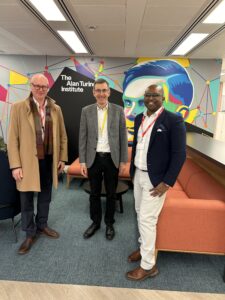Some view Innovation as an abstract, serendipitous event. We have shown through dedicating our lives to research applied in practice that this is not true. There are more efficient ways to succeed with your innovation projects if only you know what to look for! The below resources will help you get a better understanding of that.
Illuminating Pathways: Our Journey with the Alan Turing Institute and Director of Innovation, Simon Reeve
Our visit to the Alan Turing Institute, where we had the distinct pleasure of meeting with Simon Reeve, the Director of Innovation at The Alan Turing Institute, was a truly enlightening experience that broadened our horizons in the realms of AI, mathematics, and innovation management. It was not just a mere meeting but a convergence of ideas and disciplines that opened up new avenues and pathways for addressing the grand challenges we face as a society.
Exploring the Immense Possibilities of AI
During our time at the Institute, we had the privilege of diving into the immense possibilities of AI across various fields, from revolutionizing healthcare to advancing environmental sustainability. This exposure underscored the remarkable versatility of AI and its potential to drive transformative changes in our society.
The Power of Collaborative Innovation
Our visit also served as a testament to the potency of collaborative innovation. It highlighted the critical role of interdisciplinary approaches in shaping a future where technology is intricately aligned with the diverse needs of society. The connections and insights we gained at the Institute have left an enduring impression on our commitment to harnessing innovation for the greater good.
 Highlight of the Alan Turing Meeting: “AI Innovation and Impact” Document
Highlight of the Alan Turing Meeting: “AI Innovation and Impact” Document
Among the many highlights of our visit was the presentation titled “AI Innovation and Impact,” compiled by Simon Reeve, the Director of Innovation at Turing. This provided an extensive overview of how data science and AI can be leveraged to address pressing societal challenges. It elucidated the Institute’s pivotal role in offering impartial advice, providing national leadership, and nurturing cross-sector research and innovation.
The presentation identified grand challenges in areas such as health, environment, sustainability, defense, and security, with the goal of propelling progress in these domains. It also sheds light on initiatives like BridgeAI, which sought to enhance AI adoption in sectors like agriculture and construction. Furthermore, the Turing team underscores the importance of fostering informed public discourse and cultivating skills for the future to establish a digital society that enhances productivity, inclusiveness, and economic security.
The Confluence of Diversity, Mathematics, and Social Sciences
At the heart of the Alan Turing Institute lies a remarkable confluence of diversity, mathematics, and social sciences. This powerful combination has deep historical roots, tracing back to Turing himself and his team’s extraordinary achievement in deciphering the Enigma code during World War II. In today’s turbulent times, the lessons from the past resonate profoundly as we acknowledge the urgent need for diversity in both minds and backgrounds, a thirst for data-driven solutions, and the indispensable role of social sciences, including keen observation.
Diversity: A Catalyst for Innovation
The commitment to diversity forms a core element of the Institute’s DNA. Turing and his team, hailing from diverse backgrounds and disciplines, demonstrated the incredible potential that emerges when diverse minds unite to tackle complex challenges. The success of the Enigma project, which played a pivotal role in the Allied victory, exemplifies how diversity can drive innovation and expand the boundaries of what is achievable.
The Crucial Role of Mathematics
In addition to diversity, the Institute recognizes the paramount importance of mathematics as a cornerstone of progress. Turing himself was a mathematical genius, and his contributions have left an indelible mark. Today, as we grapple with complex issues, mathematics remains an indispensable tool for solving intricate problems, streamlining processes, and making informed decisions.
The Role of Social Sciences and Observation
Alongside mathematics, the Institute emphasizes the critical role of social sciences. Understanding the complex interplay of human behavior, societal dynamics, and the ethical dimensions of technological advancements is imperative. Social sciences provide the ethical compass that guides us toward responsible and inclusive AI development and other innovations.
Observation is another key facet that allows us to gain valuable insights into the world around us. It enables us to collect data, recognize patterns, and make informed decisions. In the context of AI, observation extends beyond machines to encompass human behavior and societal trends. This holistic approach ensures that the solutions we create align with the diverse needs and aspirations of communities worldwide.
Conclusion
As we look ahead, the three cornerstones – diversity, mathematics, and social sciences – remain firmly embedded in the DNA of both the Alan Turing Institute and Innovation360. Our recent meeting with Simon Reeve, the Director of Innovation at The Alan Turing Institute, served as a testament to the enduring significance of these principles, underscoring their pivotal role in shaping a future where innovation is fueled by collaboration and enriched by the lessons of history.
With anticipation and inspiration drawn from the Turing Institute’s legacy and present success, we eagerly embrace the journey ahead. While the challenges we face may be distinct, the principles that guide us – diversity, mathematics, and social sciences – continue to illuminate the path toward a brighter, more inclusive future. Together, we stand poised to navigate the turbulent waters of our times and carve a path toward innovation that benefits all of humanity.

